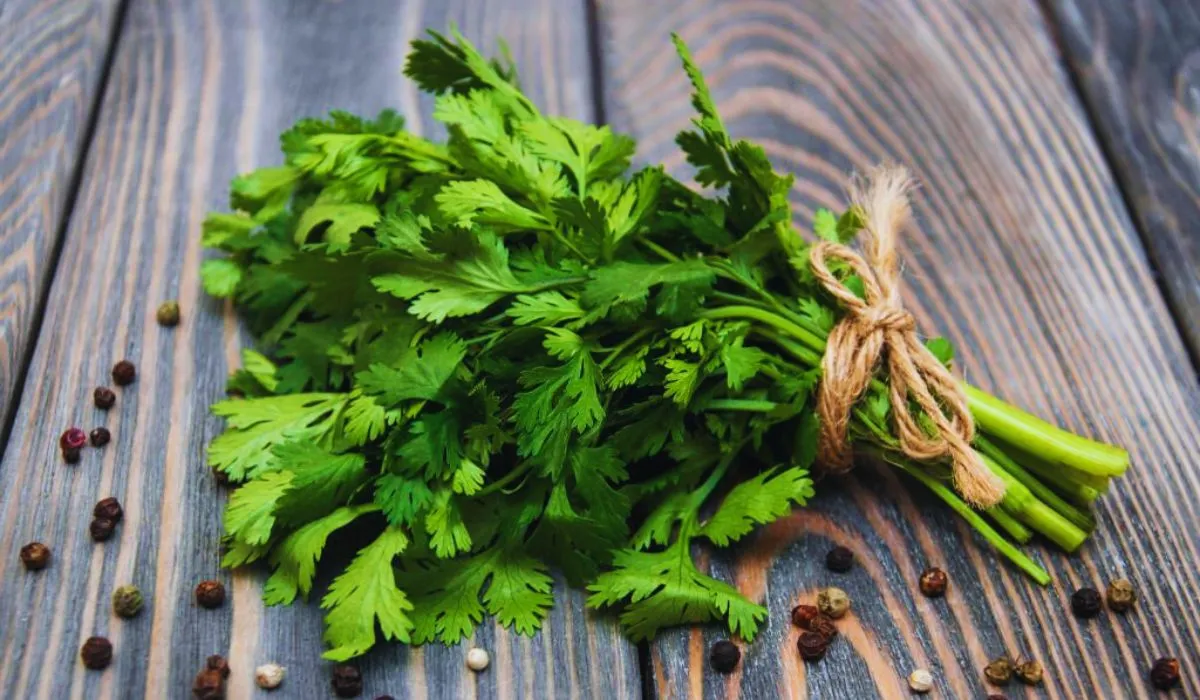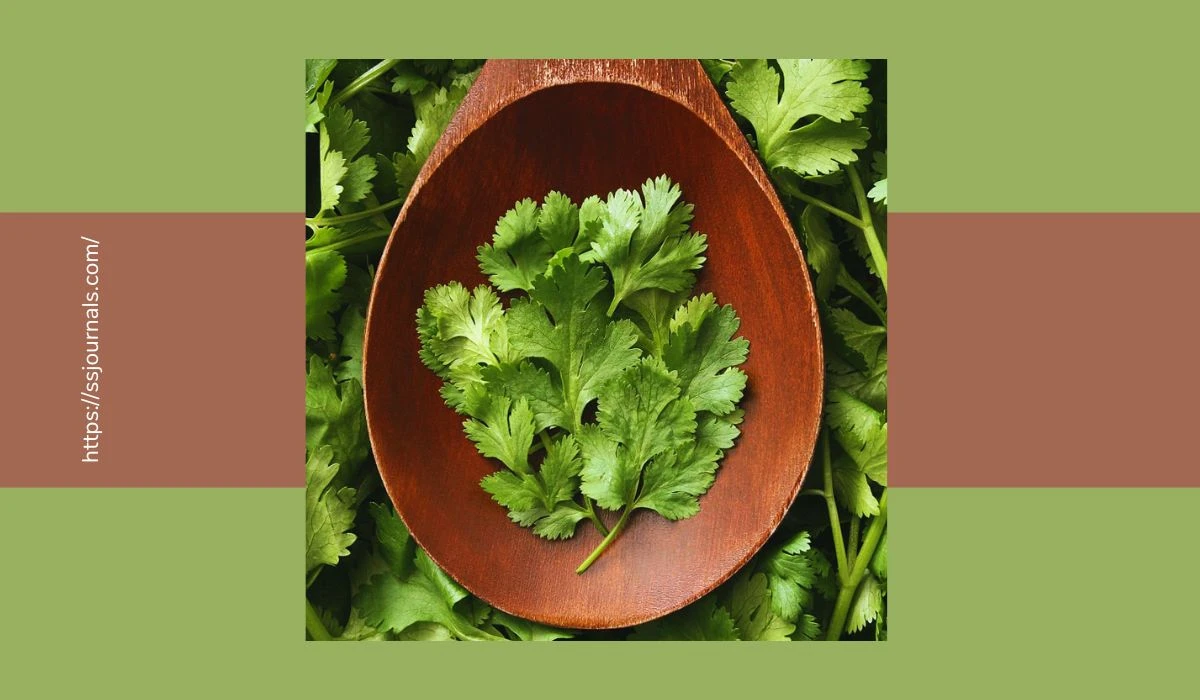Coriander, also known as cilantro, is an aromatic herb that originated in regions spanning from southern Europe and northern Africa to southwestern Asia. All parts of the coriander plant are edible, but the fresh leaves and dried seeds are most commonly used in cooking.
Coriander leaves are full of vital nutrients and have been used in traditional medicine for centuries. Let’s explore some of the top health benefits of consuming coriander leaves.
Major Benefits Of Coriander Leaves

🔹Rich In Antioxidants
Coriander leaves contain high levels of antioxidants like quercetin, kaempferol, rhamnetin, and epigenin. These powerful antioxidants help remove harmful free radicals from the body that can lead to chronic diseases. The antioxidants in coriander leaves also exhibit anti-inflammatory, antidiabetic, antimicrobial, and anticancer activities.
🔹 Supports Heart Health
Coriander leaves are an excellent source of antioxidants and acids that help lower LDL, or bad cholesterol, levels in the body. This improves cardiovascular health and reduces the risk of heart attacks and strokes. The leaves also contain trace amounts of minerals like calcium, potassium, and magnesium that regulate blood pressure.
🔹 Aids In Digestion
Coriander leaves stimulate the production of digestive enzymes and acids in the stomach. This improves digestion by breaking down foods more effectively and preventing issues like bloating, cramps, and heartburn. The herb’s anti-inflammatory properties also soothe inflammation caused by digestive disorders like IBS.
🔹 Fights Infections
Coriander leaves have strong antibacterial and antifungal properties that prevent and fight infections in the body. The essential oils in the leaves, including linalool, cineole, cymene, and terpineol, inhibit the growth of bacteria like E. coli and other pathogens. This helps prevent food poisoning and UTI infections.
🔹 Promotes Liver Health
Coriander leaves encourage the liver to produce bile by stimulating digestive enzyme secretion. This improves liver function and ensures the efficient breakdown of fats and the absorption of fat-soluble vitamins in the body. The antioxidant content in coriander leaves also protects the liver from oxidative stress and damage.
🔹 Regulates Blood Sugar
Compounds like cineole and linoleic acid in coriander leaves improve the secretion of insulin and enhance the breakdown of carbs into glucose. This helps regulate blood sugar levels in both diabetic and non-diabetic individuals. The leaves also control complications related to diabetes, like kidney damage.
How To Consume Coriander Leaves For Health Benefits?
- Add chopped coriander leaves to salads, dips like raita, and sandwiches for a nutritional boost.
- Make chutneys and sauces using the herb as a key ingredient to enjoy with snacks or as toppings.
- Use it as a garnish on dishes like soups, curries, rice preparations, and noodles.
- Add to smoothies, lassi, or mint lemonade along with other fruits.
- Prepare coriander water or tea by boiling the leaves and drinking it daily.
- Marinate meats using a coriander leaf paste to impart flavor and gain medicinal value.
- Look for supplements like capsules or tinctures with coriander leaf extracts.
Disadvantages Of Coriander Leaves
While coriander leaves have many health benefits, some drawbacks include:
- Persons with liver or kidney disease should exercise caution with coriander due to its effect on these organs.
- Pregnant women should avoid excessive use, as it may stimulate menstrual flow.
- Coriander leaves can cause sun sensitivity or contact dermatitis in some individuals.
- The herb may lower blood sugar too much when combined with diabetes medication.
- Coriander leaves have few calories, so excessive intake on an empty stomach can cause acidity.
Conclusion
Coriander or cilantro leaves can be an amazing addition to one’s diet due to their stellar nutritional profile. The leaves offer antioxidants, vitamins, minerals, and potent plant compounds that provide anti-inflammatory, antimicrobial, blood sugar-regulating, cholesterol-lowering, and digestive benefits.
Consuming coriander leaves regularly promotes overall health as it protects against chronic diseases and infections. However, those with certain medical conditions should moderate its use after consulting a doctor. When incorporated in moderation into meals, and beverages, or taken as supplements, coriander leaves can effectively boost your physical and mental well-being.
FAQs
Ans: Coriander leaves contain antioxidants like quercetin and essential oils like linalool. They also provide vitamins C, K, E, and A, along with minerals like calcium, phosphorus, potassium, and magnesium.
Ans: When consuming fresh coriander leaves, 2–5 grams per day, or about 1/4 cup, is considered safe and effective for health benefits. For dried coriander leaf powder, 1-3 grams per day can be beneficial.
Ans: Yes, coriander leaves may support weight loss due to their fiber content, which promotes satiety. The herb also aids digestion and liver function, which boosts metabolism and fat breakdown in the body.
Ans: The antispasmodic and analgesic effects of components in coriander leaves can help relieve cramping and pain during menstruation when consumed regularly. However, its stimulating effect on menses should be kept in mind.
Ans: For most healthy adults, eating coriander leaves daily in culinary amounts is considered very safe due to its long history of use as a spice and ingredient. However excessive intake as a supplement may cause side effects in some individuals.

